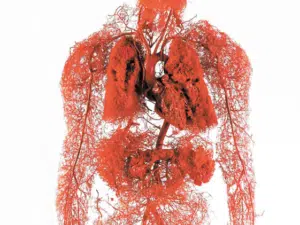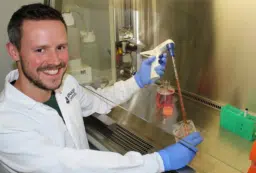Researchers at the Howard Florey Institute have discovered a new gene in the lining of arteries that makes them thicken or crack causing reduced blood flow which may lead to heart attacks, stroke or impotence.
Postdoctoral Fellow at the Howard Florey Institute, Dr Grant Drummond says the gene is found in the body’s normal immune cells where it produces toxic substances, known as oxygen radicals, to fight off infections.
“This gene is turned on in arteries by risk factors such as cholesterol, diabetes, high blood pressure and aging,” Dr Drummond says. “Oxyradicals may also cause erectile dysfunction.”
“This discovery means it may be possible to develop a new type of antioxidant drug that blocks the gene producing oxyradicals in people with cardiovascular damage,” he says.
If the cells lining the arteries produce too many oxyradicals, this stops a protective chemical (nitric oxide) from working, leading to thickening of the artery wall, uptake of cholesterol and formation of fatty deposits in the artery.
“If oxyradicals bombard these thickened walls, the thickened arteries can suddenly rupture forming a clot that can cause heart attacks or stroke,” Dr Drummond says. “Impotence results from too many oxyradicals in the penis or the arteries feeding it, leading to reduced blood flow.”
Research is now looking for drug and gene therapies that can switch off this gene, reducing the incidence of heart attack, stroke and possibly impotence.
Dr Drummond is one of sixteen young scientists presenting their discoveries to the media, public and students for the first time, at Fresh Science.
“We’ve selected them from 105 national nominations, brought them to Melbourne, trained them and thrown them to the [media] lions,” said Niall Byrne, Chairman of Fresh Science. “It’s all about focussing public and media attention on Australian scientific achievement.”





 Fresh Science is on hold for 2022. We will be back in 2023.
Fresh Science is on hold for 2022. We will be back in 2023.